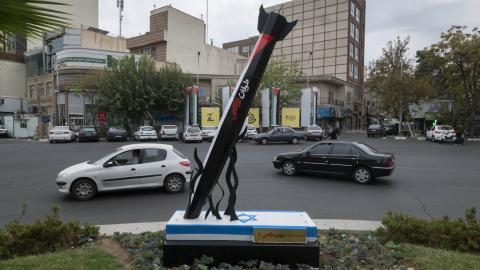President Joe Biden visited Israel Wednesday in a dramatic show of sympathy and solidarity with the Jewish state, following the October 7 Hamas-led terrorist assault. The day before, German Chancellor Olaf Sholz was in Tel Aviv; UK Prime Minister Rishi Sunak arrived on Thursday, and French President Emmanuel Macron is expected to follow suit before long. After the attack, Biden, Sunak, Scholz, Macron, and Italian Prime Minister Giorgia Meloni issued powerful, unequivocal statements of support, both individually and collectively. Their joint statement, issued on October 9, concluded with a pledge that “[o]ver the coming days, we will remain united and coordinated, together as allies, and as common friends of Israel, to ensure Israel is able to defend itself, and to ultimately set the conditions for a peaceful and integrated Middle East region.”
These visits and strong declarations have provided welcome reassurance to Israelis as they mourn and prepare to fight, and they send a message of rejection, resolve, and unity to the Palestinian terrorist groups, their allies in Lebanon, and their sponsors in Iran, all of whom openly call for Israel’s annihilation. But President Biden and his European counterparts might not have realized how quickly their commitment would be tested.
Hamas and Islamic Jihad continue to fill Israel’s skies with rockets and missiles designed and paid for by Iran. As fate would have it, Biden arrived in Israel on October 18, the exact date that the UN missile embargo on Iran expired, under the terms of the Iran nuclear deal.
Making it easier for Iran to produce and proliferate missiles while Israel is still under attack risks undermining the impassioned American and European statements of support and making the leaders issuing them look ridiculous. Unless the United States and one or more of the E3 countries (France, Germany, and the UK) act quickly, Iran is about to become even more dangerous.
UN Security Council resolution 2231 accompanied the nuclear deal, formally known as the Joint Comprehensive Plan of Action (JCPOA). The resolution gradually suspends a series of earlier resolutions that imposed arms and missile embargoes and other sanctions on Iran because of its illegal nuclear weapons program. Resolution 2231 already lifted an arms embargo on Iran in 2020. The good news is that any one of the E3 can initiate a veto-proof “snap-back” of the entire series of resolutions. There is ample reason to do so.
The snap-back mechanism was designed for use in the event of “significant Iranian non-compliance” with the terms of the nuclear deal. Since 2019, a year after the U.S. withdrawal from the JCPOA, and even more so since 2021, when the U.S. announced its desire to return to the JCPOA, Iran increasingly has violated not only the terms of the agreement, but also its international obligations under the Nuclear Non-Proliferation Treaty.
Iran is stockpiling highly enriched uranium that the U.S., the EU, and the International Atomic Energy Agency (IAEA) all have acknowledged has no plausible civilian purpose. At the same time, Tehran refuses to cooperate with IAEA investigations into undeclared nuclear sites, materials, and activities, and it is developing, testing, distributing, and attacking its neighbors with a variety of ballistic and cruise missiles.
And as Iran continues to expand its production of the fuel and missiles necessary for the assembly and delivery of nuclear weapons, it is funding, training, and arming Hezbollah in Lebanon and Hamas and Islamic Jihad in Gaza. The Islamic Republic also is sending drones and other arms to Russia for its war on Ukraine. Reportedly, Iran held off on the provision of missiles to Russia until after the expiration of the UN embargo.
Activating snap-back would take on all these issues: It would restore the arms and missile embargoes and re-impose a blanket prohibition on uranium enrichment in Iran.
Implementation of snap-back would be difficult, politically and practically. The E3 will not initiate the process without pressure and backing from Washington. The United States and its European partners, clearly deterred by the possibility of Iranian escalation, would have to enforce the resolutions for them to be effective. Russia and China would look for ways to block the effort in the Security Council. Not that it would make much practical difference, but the long-comatose JCPOA would be pronounced dead.
Fearful opponents of snap-back will argue that it would increase the chances of war with Iran. This misconception misses or ignores that Iran already is at war with the United States, Europe, Israel, and their partners and allies. The attack from Gaza and Iran’s nuclear program are two fronts in the same wider conflict.
The evidence is overwhelming — from the far-reaching concessions made to conclude the JCPOA, failing to respond to Iranian attacks on U.S. forces, and Israel’s recent gestures toward Hamas, among other things — that containing, placating, or trying to “buy off” Iran and its terrorist proxies only embolden, entrench, and enrich them and incentivize their cruelty. Capitulation and excessive caution are seen as cowardice and a lack of resolve. These are what actually make war more likely.
There is a better way.
Coming together now to push back hard against Iran’s nuclear lawlessness, its wanton proliferation of missiles and other weapons to America’s enemies, and its unbridled support for terrorist groups that continue to target Americans, Europeans, Israelis, Arabs, and others in their homes offers the greatest promise of winning the war and defeating Iran.
If President Biden and the other leaders who issued last week’s inspiring statement truly seek to “set the conditions for a peaceful and integrated Middle East,” then supporting Israel’s fight against Hamas in the difficult months ahead and acting now to stop Iran’s nuclear and missile programs are essential and complementary first steps.
The U.S. and its European allies face a choice: Will they rise to the occasion and meet the just and lofty goals they set for themselves, or will they blink and be forced to issue more frequent and less convincing statements of support for the bloodied victims of Iran’s murderous aggression?

















